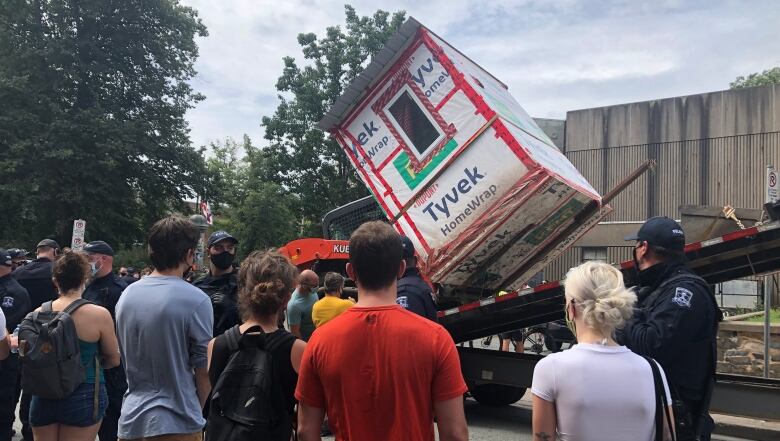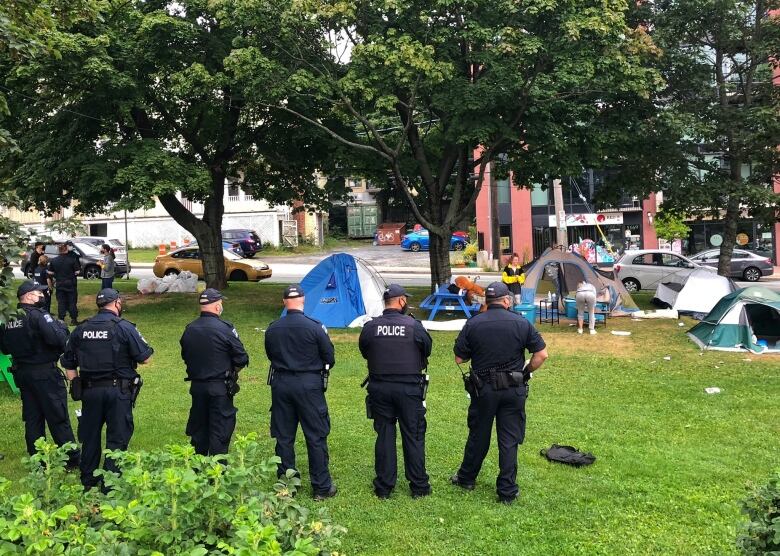Halifax made 'conscious decision' to keep date it would clear encampments secret
Emails reveal Halifax feared 'serious risks' to workers removing homeless encampment if word got out

Sheri Lecker remembers Aug.18 as a hot day, a day when she had to carry water with her to refresh people who had just lost many of their most important belongings.
Halifax police were breakingup a series of tent encampments where homeless residents had been living, and Leckerwasrushing around the city trying to find housing for people who were displaced. Hotels were mostly full of tourists and shelters had few beds.
"I remember one person didn't have ID," she said of a group of people she met that afternoon. "They didn't have phones. They didn't know who to connect with. Where were they going to go? What should they do?"
If Lecker,the executive director of Adsum for Women and Children, a Halifax-based organization that helps find safe housing for hundreds of people every year,had known the removal was coming that day, she saidshe might have been able to do more to help those living at the sites.
"Maybe it wouldn't have changed the answer for where they were staying that night, but it would have lessened some of the trauma that they experienced and the chaos of the day," she said.

But she did not know what was about to happen, and that was by design.
According to documents obtained by CBC under access-to-information laws, the city's chief administrative officersaid there was a "conscious decision" not to make the date known to service providers like Adsum. It's unclear exactly who made that decision, but there was concernadvance warning would pose "serious risks" to the operation and staff.
Lecker feels the municipality's choice seriously damaged the trust between the municipality and some of the housing and homelessness organizations that work in the city, and harmed the homeless residents who were displaced that day.
Early on the morning of Aug. 18, Halifax police began to remove tents put up by people living in Halifax parks at Horseshoe Island, Peace and Friendship Park, and the Common. They also removed tents and wooden shelters put up by a group called Halifax Mutual Aid at the old Central Library grounds on Spring Garden Road.
Hundreds of people gathered for a protest around the wooden shelters on the old library site, attempting to physically block police and municipal employees from removing the structures. During the afternoon police used pepper spray on the crowd and 24 people were arrested and charged.

The first public warning that something was about to happen came onAug. 16, two days before the removals.The city placed approximately 40 notices on tents and shelters, telling the people inside that living in parks is illegal and directing them to move out, or risk being fined or arrested.
But unlike a previous set of notices the city sent out in July notices it later said it wouldn't enforce there was no deadline given to remove the shelters.
On the same morning, the city's CAO,Jacques Dub, sent a message to the mayor and councillors, telling them the notices were being posted.
"We intend to remove all tents and temporary shelters at some future date and will advise when that operation begins," Dub wrote.
Dub also included a question-and-answer document in his message to council, stating that offers of housing or temporary accommodations had been made to people in the encampments, and that the city would prioritize removing the tents and shelters using a "case-by-case assessment."

Community legal worker Mark Culligan was at work at Dalhousie Legal Aid's offices in north-end Halifax when the notices started to go out. Several people who were living in tents contacted him about an hour after distribution started.
"They wanted to ask about their rights and to see if there was any kind of support that we could give," he said.
The following day, which was the Tuesday of a provincial election, Culligan went to some of the parks and spoke to people who received the notices.
"We were very concerned that what the city was planning to do would constitute a violation of the human rights of people who were living in tents and the crisis shelters," he said.
The city has said consistently that housing or hotels had been offered repeatedly to the people living in parks in the months and weeks leading up to the eviction, as well as on the day itself. But Culligan said when he spoke to people living at the sites, they told him they had"been given no actual offer of a place to stay."

Culligan wrote to Mayor Mike Savage on Tuesday afternoon to ask when the city was planning to enforce the parks bylaw, and to urge the mayor to pause the plan until after the city could meet with "community stakeholders."
Culligan hoped to convince the mayor not to carry out any evictions. But if they did go ahead, he hoped theywould be done in an "orderly manner, in a manner that ensured that people were actually provided with a place to stay."
Culligan got no response from the mayor's office, and discovered over his breakfast the next morning that police officers had moved in to break up the camps.
'People had to act quickly'
The emails obtained by CBC reveal that staff in the CAO's office had already determined the removal date needed to be confidential.
On the day after the removal, Dub emailed Paul Johnston, the city's managing director of government relations and external affairs, with a question about a street navigator's statement that he had to "scramble" to find lodging for people during the removal.
"That would appear, on the faceof it, to not jive with our statement that everyone was offered a place to stay," Dub wrote to Johnston. "There is no doubt that people had to act quickly with offers of support and coordinate the spaces on short notice. Please advise as to the facts."
Johnston explained that navigators and the province were told that notices had beenissued, but because the actual removal was a police operation it "had to be kept confidential until the work began early in the morning."
Johnston acknowledged that "it was a bit of a scramble yesterday for [outreach workers] to coordinate on short notice."

The mayor's chief of staff, Shaune MacKinlay, who was copied on the email, stated that some service providers were upset they did not know the city planned to move on the tents.
Dub replied, "we made a conscious decision to not telegraph our operation to those agencies given the serious risks of doing so.
"Three sites we evacuated without a problem but had we telegraphed those, the scenario we saw at the library would be times four instead of one."
Advanced notice would have helped
Culligan said if he had known in advance he would have tried to convince the city not to go ahead.
"The reality is that the city itself does not have the power to directly provide housing supports. It has to work through service providers in the community," Culligan said.
"By deciding to cut out those service providers from the decision-making process, the city had no way to confirm in real time that what it was saying was actually true: that alternative accommodations were offered in a meaningful way to everyone who was in the tents and crisis shelters."

Lecker said the suggestion that the locations could not have been cleared safely if organizations like Adsum had known in advance was "hard to read."
"I think the strategy has certainly damaged the sense of trust that may have existed between the community, the wider community, citizens and the city, and of course, those of us who do this work every day," she said.
"Three months later, knowing that there are people still sleeping outside in tents and in crisis shelters who have no other option to be safe and dry and warm tonight, I have to question whether it was the right strategy."
It is clear from the documents released to CBC that although some in the public were in favour of the city's decision to evict, officials were bombarded by messages from many others who disagreed strongly.
'Irate' public reaction
Staff in the mayor's office were unable to emptyvoicemail boxes fast enough as they filled up with phone calls. There were "irate" visitors to city hall. Hundreds of furious and sometimes profane emails poured in.
"This is the stuff that nightmares are made of," one staff person in the mayor's office wrote to the others.
Through the afternoon protestors attempted to block access to the shelters at the library siteand police used pepper spray on the crowd. Emails obtained from senior staff at the Department of Health and Wellness show paramedics treated at least 21 people, mostly for being hit with pepper spray.

CBC reached out to the city and to Dub to ask questions about the choice to enforce the parks bylaw, including how the city evaluates the removals on Aug.18 in hindsight, and whether it would use a similar removal strategy in the future. The city responded that the CAO was not available for an interview.
The city provided a statement that read in part:"Treating people with dignity, while working to find ways to best support them within our capacity and scope as a municipality, is a top priority.
"The situation at a number of parks in August, due to a proliferation of tents, created an unacceptable risk to the health and safety of both the tent and temporary shelter occupants and the public."
The statement addedthat enforcement was not preferable but used "based on associated risks. The chief of police made the determination related to police deployment based on public safety considerations."
Solving crisis will take collaboration
Lecker said a group of service providers spearheaded by Adsum have been meeting with city staff since the Aug.18 removal. She feels some work needs to be done on the trust relationship.
"If I have learned anything in almost two decades of doing this work in this city, it's that no one level of government can solve this crisis on their own," she said.
"Organizations like mine that are used to providing support to people around housing and also housing itself, we bring a lot of experience and expertise.
"You need to involve us and you need to involve the people who have lived experience of homelessness if we're going to get out of this crisis."
MORE TOP STORIES












_(720p).jpg)


 OFFICIAL HD MUSIC VIDEO.jpg)
.jpg)



























































































